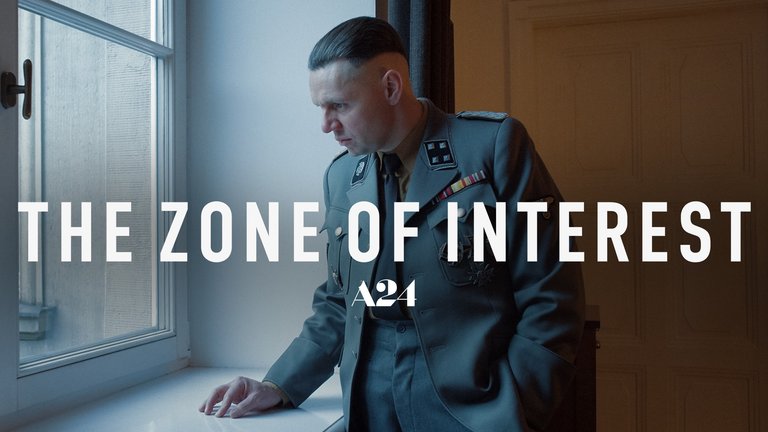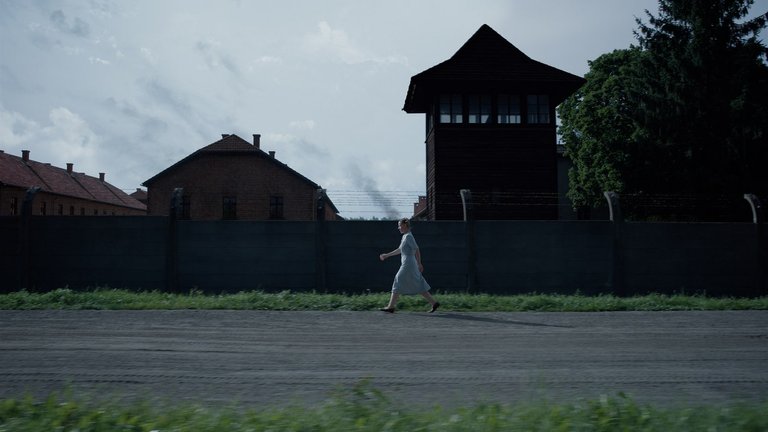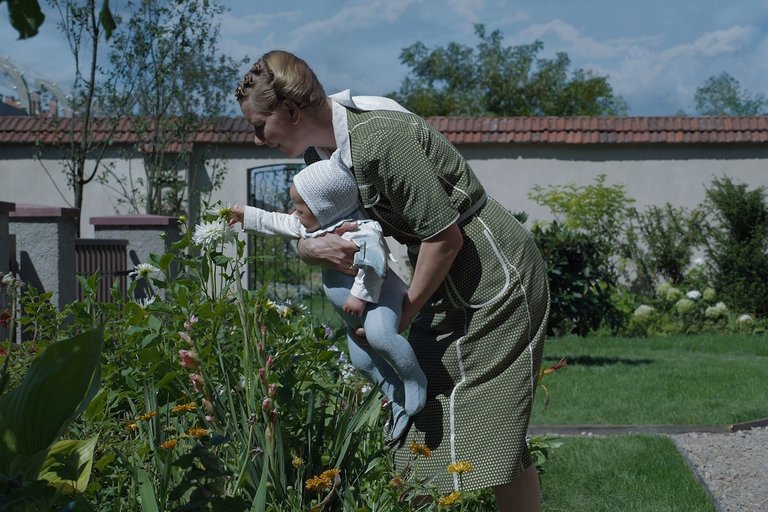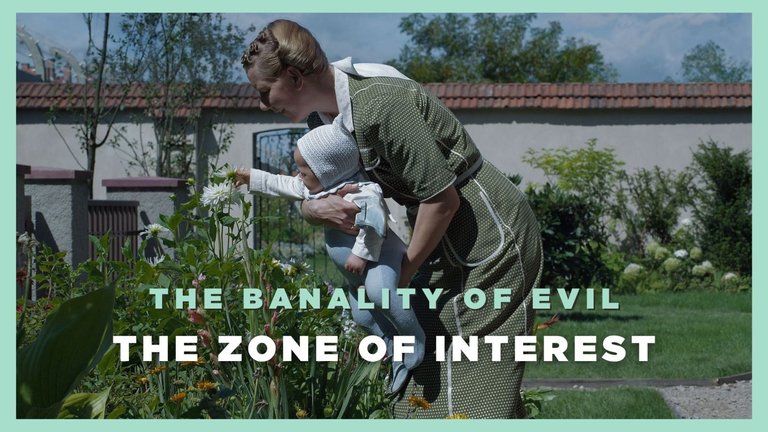
Proper Source
English Version
Hannah Arendt, a stateless exile in the United States (not recognised by either Germany or the USA), went as a journalist-chronicler to the trial of Adolf Eichmann in Jerusalem, Israel, in 1960. The "architect" of evil had been captured, kidnapped and forcibly taken from Argentina to the then young Hebrew nation to stand trial for his proven involvement in the Holocaust machine in Europe during World War II. Why is this relevant? Because it was in this context that Arendt's concept of the "banality of evil" saw the light of day. The philosopher without a homeland analysed the implication of evil on the executioners, and astonished herself....
The Zone of Interest is an Academy Award winning film in the category of "Best Foreign Film". For me, it is a total work of art. It is superbly directed by Jonathan Glazer, who interestingly, comes from the world of advertising and the music industry; having been responsible for the videos for Radiohead's "Karma Police", among other artists..... The director's vision is crucial to understanding the final product. This beautiful work is bleak, cold, raw, and uncomfortably routine. It is a reflection of the days in the Villa where Rudolf Hoess and his entire family, including the in-laws, and the children of the Hoess couple lived, breathed, and grew up alongside the most unspeakable horror of all.
For those who may not know, let us recall that Rudolf Hoess was the commandant in charge of the entire system of Concentration and Death Camps in the Auschwitz-Birkenau and Auschwitz-Monowitz area. Under his direct command, more than a million human beings died in the cruelest manner imaginable. Not only Jews, although they accounted for the vast majority of the vile murders, but also enemies of the German state, homosexuals, Roma, political dissidents, Slavs and countless other minorities of the time. Let us not forget, either, that the German plan for the "Jewish Question" was a veritable killing machine.
And in this film, what we see is the undisguised terror of the utter banality of evil.... Hundreds, if not thousands of people, knew about this; and in the film we see how no one really cares in the slightest about what goes on behind the high but not imposing fences that enclose the Hoess home. In this respect, this work is splendid. At no point does it make use of the explicit, but plays with open shots and the power of sound as a narrative tool to make the viewer feel what the images convey: which is ultimately nothing more than a frightening normality....
Inside the death villa, we see how the wife, her sisters, the children of the couple, the visitors and even the pets live a life as ordinary and commonplace as any of us could live. And this is precisely what Hannah Arendt saw during her on-site analysis of the Eichmann trial in 1960. Eichmann was accused by the prosecutor in charge of the case of being a sadistic psychopath who took cold-blooded pleasure in making hundreds of millions of people suffer and sending them to Auschwitz for their tragic final fate.... This is something that Arendt categorically denied when she stated the following:

Proper Source
"Strange and counter-intuitive as it may seem, all those who made the Holocaust possible were not so different from what you and I might be. They (those who carried out the annihilation) saw the dehumanisation of the beings they enslaved and reduced to ashes as 'normal'. From the killers' perspective, they were simply doing one more duty. The remorse and the bonds of empathy and humanity that we all possess were impossible for them to feel and apply. Yes, they were just following orders, like automatons. They were not particularly evil, which does not exempt them from what they did, nor does it take away their guilt; but they could have been like your neighbour, your teacher, or the doctor in your daughter's office.
It is shocking how accurate this is. Although the film is not based on Arendt's genius but on the novel of the same name, and adapted by Jonathan Glazer, it is no less true that the film's running time is directly related to what the previous paragraph explains. It is bitter, horrifying and repulsive, but not for the reasons we might all intuit, but for the sheer lack of humanity that was common in a society indoctrinated towards hatred. It didn't matter what position, age or social standing. That's why watching this film as an audience is an exercise in courage, unprecedented historical rigour and cinematography at its best. Seriously, see this masterpiece.

Proper Source
Versión en Español
En 1960, Hannah Arendt, exiliada en los Estados Unidos, de manera apátrida (sin ser reconocida ni por Alemania o por USA) fue, en calidad de periodista-cronista al juicio de Adolf Eichmann en Jerusalem, Israel. El "arquitecto" del mal había sido capturado, secuestrado y llevado a la fuerza desde Argentina, hacia la para entonces joven nación hebrea, para ser juzgado por su más que comprobada participación en la maquinaria del Holocausto en Europa durante la Segunda Guerra Mundial. ¿Por qué esto es relevante? Porque fue en ese contexto que el concepto de la "banalidad del mal", por Arendt vio la luz. La filósofa sin patria analizó la implicancia de la maldad en los ejecutores, y se asombró....
La Zona de Interés es una película ganadora del premio de la Academia en la categoría de "Mejor película extranjera". Para mí, es una obra de arte total. Está magníficamente dirigida por Jonathan Glazer, que curiosamente, proviene del mundo de la publicidad y de la industria musical; al ser responsable de los vídeos de "Karma Police" de Radiohead, entre otros artistas.... La visión del director es crucial para entender el producto final. Esta obra hermosa, es sombría, fría, cruda, e incómodamente rutinaria. Es un reflejo de los días en la Villa donde Rudolf Hoess y toda su familia, incluida, la familia política, y los niños del matrimonio Hoess vivieron, respiraron y crecieron al lado del horror más indecible de todos.
Recordemos, para aquellos que quizá no lo sepan, que Rudolf Hoess fue el comandante encargado de todo el sistema de Campos de Concentración y Muerte en la zona de Auschwitz-Birkenau y Auschwitz-Monowitz. Bajo su mando directo, murieron de la manera más cruel que se pueda imaginar más de un millón de seres humanos. No sólamente judios, que aunque fueron la inmensa mayoría de los viles asesinatos, también hay que contar enemigos del Estado alemán, homosexuales, romaníes, disidentes políticos, eslavos, entre innumerables minorías de la época. No olvidemos tampoco, que el plan alemán para la "Cuestión Judía" fue una verdadera máquina de matar.
Y en este film, lo que observamos es el terror indisimulable de la más absoluta banalidad del mal... Cientos, sino miles de personas, sabían de esto; y en la película vemos cómo a nadie realmente le importa en lo más mínimo lo que sucede detrás de las altas pero no imponentes vallas que cercan el hogar de los Hoess. En este sentido, esta obra es espléndida. En ningún momento se hace uso de lo explícito, sino que juega con planos abiertos y la fuerza del sonido como herramienta narrativa para que el espectador sienta lo que las imágenes transmiten: que en definitiva, no es más que una espantosa normalidad....
Vemos como la esposa, las hermanas de ésta, los niños del matrimonio, las visitas y hasta las mascotas dentro de esa Villa de muerte viven una vida tan común y tan ordinaria como cualquier de nosotros podríamos vivirla. Y eso es precisamente, lo que Hannah Arendt en 1960 pudo ver también durante el análisis en situ del juicio a Eichmann. A éste último se le acusaba, por parte del fiscal encargado del caso, de ser un sádico psicópata, que disfrutaba a sangre fría de hacer sufrir a cientos de millones de personas y enviarlas a Auschwitz para su trágico destino final... Cuestión que Arendt desmintió categóricamente al afirmar lo siguiente:

Proper Source
"Aunque parezca extraño y contraintuitivo, todos los que hicieron posible el Holocausto, no eran tan diferentes a lo que ustes y yo pudiéramos ser. Ellos (los que llevaron a cabo la aniquilación) veían como "normal" la deshumanización de los seres que esclavizaron y redujeron a cenizas. Desde la perspectiva de los asesinos, sencillamente cumplían con un deber más. El remordimientos y los vínculos de empatía y Humanidad que todos poseemos, les eran imposible de sentir y aplicar. Sí, sólo seguían órdenes, como autómatas. No eran especialmente malvados; lo que tampoco les exime de lo que hicieron ni les resta culpa; pero podrían haber sido como tu vecino, tu maestro o el doctor que atiende en el consultorio de tu hija".
Es escalofriante lo acertado que es esto. Si bien, la película no está basada en el genio de Arendt sino en la novela homónima, y adaptada por Jonathan Glazer, no menos cierto es que lo que dura el metraje del film está directamente relacionado a lo que el párrafo anterior explica. Es amarga, horrenda y repulsiva, pero no por las razones que todos podrían intuir, sino por la mera falta de humanidad que era común en una sociedad adoctrinada hacia el odio. Daba igual el cargo, la edad o la posición social. Por eso, ver como audiencia este film es un ejercicio de valor, rigor histórico sin precedentes y cinematografía en su mejor esplendor. En serio, vean esta obra maestra.

Proper Source










Interesante propuesta cinematográfica, no la he visto nunca, así que de seguro la pondré en mi lista de películas por ver, muchas gracias por la recomendación y muy buena reseña. Feliz día
Es la actual ganadora a "Mejor película extranjera" de los Academy Awards de 2024. Y sí, esta película es arte en su mayor y mejor esplendor
¡Felicitaciones!
Estás participando para optar a la mención especial que se efectuará el domingo 12 de mayo del 2024 a las 8:00 pm (hora de Venezuela), gracias a la cual el autor del artículo seleccionado recibirá la cantidad de 1 HIVE transferida a su cuenta.
¡También has recibido 1 ENTROKEN! El token del PROYECTO ENTROPÍA impulsado por la plataforma Steem-Engine.
1. Invierte en el PROYECTO ENTROPÍA y recibe ganancias semanalmente. Entra aquí para más información.
2. Contáctanos en Discord: https://discord.gg/hkCjFeb
3. Suscríbete a nuestra COMUNIDAD y apoya al trail de @Entropia y así podrás ganar recompensas de curación de forma automática. Entra aquí para más información sobre nuestro trail.
4. Visita nuestro canal de Youtube.
Atentamente
El equipo de curación del PROYECTO ENTROPÍA